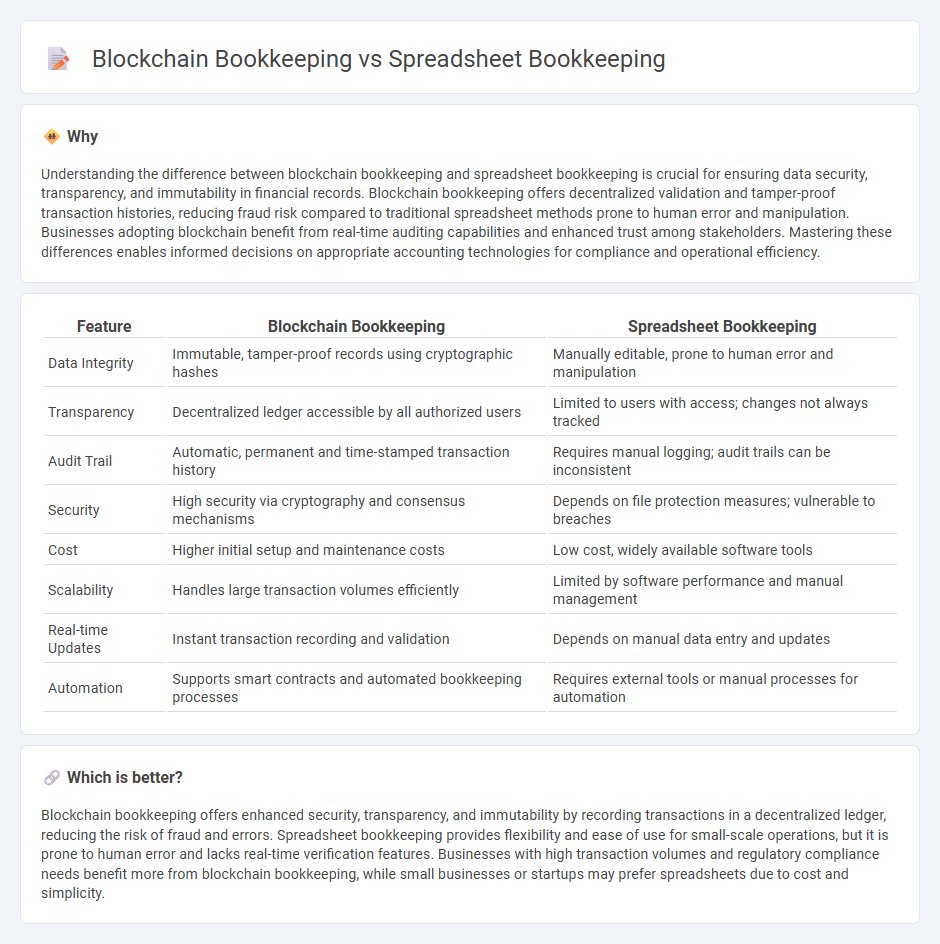
Blockchain bookkeeping offers enhanced security, transparency, and immutability by recording transactions on decentralized ledgers, reducing the risk of fraud and errors commonly found in spreadsheet bookkeeping. Spreadsheet bookkeeping relies on manual data entry and is prone to inaccuracies, data manipulation, and limited collaborative access, making it less reliable for complex financial tracking. Explore how blockchain technology is transforming accounting practices and improving financial data integrity.
Why it is important
Understanding the difference between blockchain bookkeeping and spreadsheet bookkeeping is crucial for ensuring data security, transparency, and immutability in financial records. Blockchain bookkeeping offers decentralized validation and tamper-proof transaction histories, reducing fraud risk compared to traditional spreadsheet methods prone to human error and manipulation. Businesses adopting blockchain benefit from real-time auditing capabilities and enhanced trust among stakeholders. Mastering these differences enables informed decisions on appropriate accounting technologies for compliance and operational efficiency.
Comparison Table
| Feature | Blockchain Bookkeeping | Spreadsheet Bookkeeping |
|---|---|---|
| Data Integrity | Immutable, tamper-proof records using cryptographic hashes | Manually editable, prone to human error and manipulation |
| Transparency | Decentralized ledger accessible by all authorized users | Limited to users with access; changes not always tracked |
| Audit Trail | Automatic, permanent and time-stamped transaction history | Requires manual logging; audit trails can be inconsistent |
| Security | High security via cryptography and consensus mechanisms | Depends on file protection measures; vulnerable to breaches |
| Cost | Higher initial setup and maintenance costs | Low cost, widely available software tools |
| Scalability | Handles large transaction volumes efficiently | Limited by software performance and manual management |
| Real-time Updates | Instant transaction recording and validation | Depends on manual data entry and updates |
| Automation | Supports smart contracts and automated bookkeeping processes | Requires external tools or manual processes for automation |
Which is better?
Blockchain bookkeeping offers enhanced security, transparency, and immutability by recording transactions in a decentralized ledger, reducing the risk of fraud and errors. Spreadsheet bookkeeping provides flexibility and ease of use for small-scale operations, but it is prone to human error and lacks real-time verification features. Businesses with high transaction volumes and regulatory compliance needs benefit more from blockchain bookkeeping, while small businesses or startups may prefer spreadsheets due to cost and simplicity.
Connection
Blockchain bookkeeping and spreadsheet bookkeeping intersect through the fundamental task of recording financial transactions, where blockchain provides a decentralized, immutable ledger enhancing data security and transparency, while spreadsheets offer flexible, user-friendly tools for data manipulation and analysis. Integration of blockchain with spreadsheet systems enables auditors and accountants to efficiently verify transaction authenticity and perform real-time reconciliation, optimizing financial reporting accuracy. This synergy leverages blockchain's cryptographic proof with spreadsheet's analytical capabilities, revolutionizing traditional accounting processes.
Key Terms
Ledger
Spreadsheet bookkeeping relies on traditional ledgers that organize financial data in rows and columns, offering flexibility but limited security and immutability. Blockchain bookkeeping employs decentralized ledgers that record transactions across multiple nodes, ensuring transparency, tamper resistance, and real-time verification. Explore how ledger technology transforms accuracy and trust in financial record-keeping.
Double-entry
Double-entry bookkeeping in spreadsheets relies on manual data entry and formulas to ensure each financial transaction impacts two accounts, maintaining balance. Blockchain bookkeeping automates the double-entry process using decentralized ledgers, providing enhanced transparency, immutability, and real-time verification across all participants. Discover how blockchain revolutionizes accuracy and trust in double-entry bookkeeping beyond traditional spreadsheets.
Immutability
Spreadsheet bookkeeping stores data that can be easily altered, posing risks to data integrity and fraud detection. Blockchain bookkeeping ensures immutability through cryptographic hashing and decentralized consensus, preventing unauthorized changes to transaction records. Explore the benefits of immutable ledgers to enhance your financial data security.
Source and External Links
Small Business Bookkeeping Template - This Excel template simplifies bookkeeping by tracking income, expenses, and profit with automatic calculations and supports multiple currencies.
Bookkeeping With Excel/Spreadsheets - This video provides an introduction to using Excel for basic bookkeeping tasks, such as recording income and expenses.
How to Do Small Business Bookkeeping in Excel Like a Boss - This article guides users on setting up a bookkeeping system in Excel and offers a free bookkeeping template for small businesses.
 dowidth.com
dowidth.com